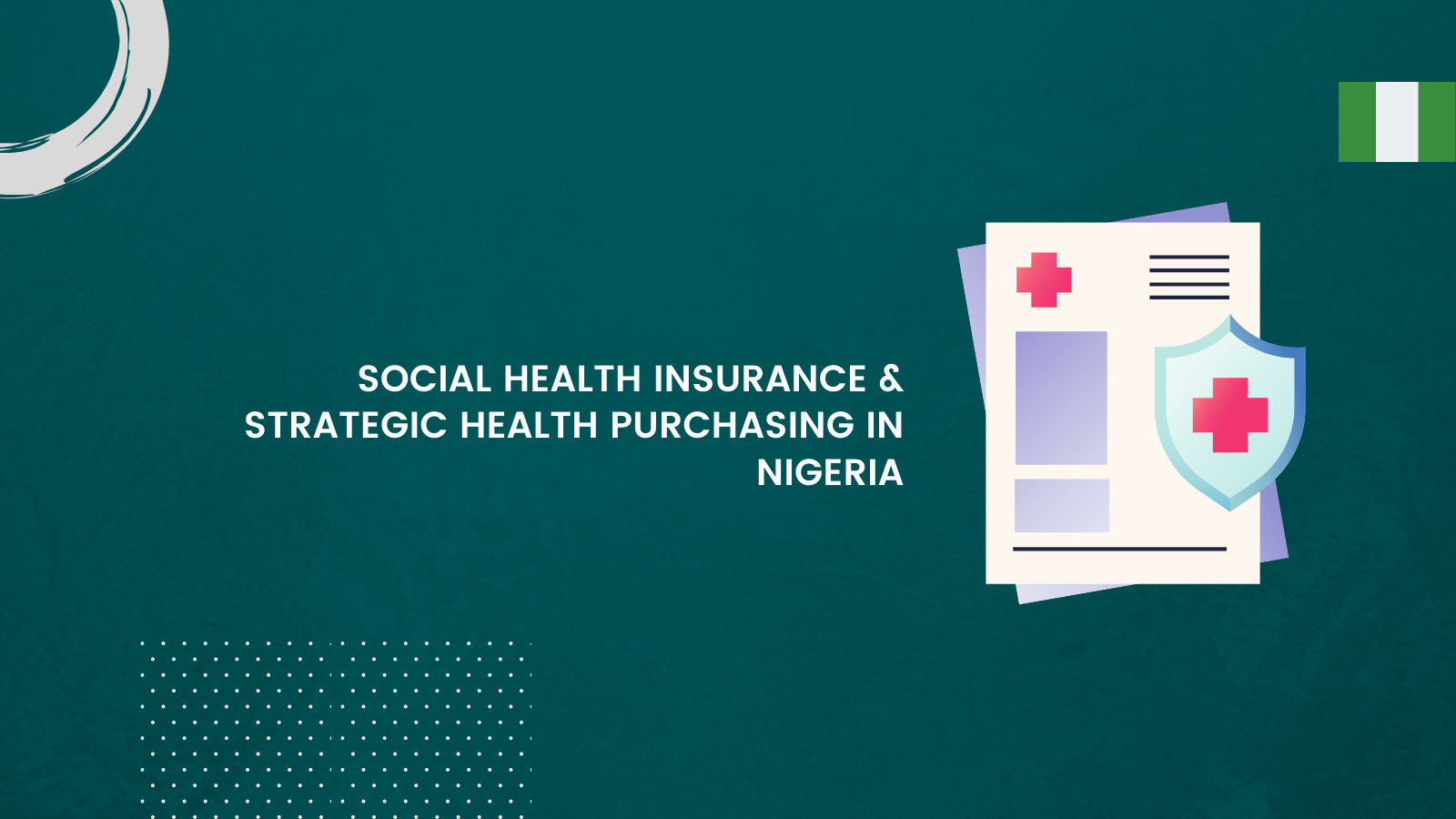Social Health Insurance and Strategic Health Purchasing in Nigeria
In Nigeria, there are about 4.3% of Nigerians registered in one form of social health insurance programme or the other. The National Health Insurance Scheme (NHIS) is the agency responsible for social health insurance. It provides the primary purchasing function of setting guidelines and standards for the social health insurance programmes in the country. NHIS also ensures the accreditation of providers and Health Maintenance Organisations (HMO). As simple as it sounds, NHIS’ mandate is to provide easy access to quality health care services and help achieve universal health coverage (UHC) for the Nigerian population.
As primary purchasers, the NHIS’ sources of funding include:
- Enrollees’ premiums,
- Grants received from federal, state and local governments,
- Contributions from the organized private sector and international organizations, dividends and interest on stocks and investments, and,
- All other funds which may accrue from time to time.
The NHIF’s aim in Nigeria is removing the financial barrier to healthcare; this is accomplished through engaging HMOs to contract service providers and effect payments through the use of a mix of provider payment mechanisms (PPMs). However, there are a few disparities with provider autonomy. There are roughly 12,000 health care facilities (HCFs) that provide service to the enrollees of the scheme, and their aggregate distribution is 60% private and 40% public HCFs. To some extent, the public tertiary institutions and most privately owned facilities have an adequate level of autonomy in respect to resource utilization and decision making. In contrast, public primary and secondary health facilities have much less independence. They are directly answerable to their Local Government Authority and State Hospital Management Boards (SHMB), respectively.
Lately, many low- and middle-income countries (LMICs) are pursuing reforms to make purchasing of health care services more strategic. The goal is to improve the quality of health care services delivered, as well as to incorporate efficiency in health spending and promote equity in the health system. Nigeria seems to have joined the train but is yet to see far-reaching results in service delivery outcomes. Almost two decades after its inception, although the NHIS has accumulated a commensurate operative ability, the enrollee expansion process has been a dilemma for the health insurance regulator – the undefined governance arrangement between the government, the purchasing agency and other stakeholders limits the transformational mandate of the scheme.
Strategic health purchasing (SHP), as against ‘passive’ purchasing, may constitute an appreciable remedy in this regard, supporting the achievement of significant service delivery results and health system goals. SHP, through well-coordinated purchasing functions, generates incentives for service providers, and this allows them to contribute positively to health system goals. Thus, this blog provides information on how SHP in Nigeria’s NHIS affects intermediate and service delivery outcomes.
Healthcare Purchasing and Strategic Health Purchasing Functions
Ideally, purchasing in healthcare relates to obtaining the health services needed by a person, group or population segment, from a responsible service provider. This service provider, in return, receives corresponding or established payments for services rendered. Health care purchasing denotes activities, such as ensuring the availability of services and its provision; demand and payment for services; as well as the regulation of utilization of services for quality and responsiveness. Purchasing becomes strategic when there is ‘active, evidence-based engagement in defining the service-mix and volume and selecting the provider-mix to maximize societal objectives’.
Thus, SHP involves making decisions on what to buy (specification of health services), from whom to buy (choice of providers) and how to buy (payment mechanisms). ‘Purchasing functions’ is a term used to describe components of these planned choices. In contrast, purchasing is passive if poorly designed, and non-evidence-based processes encumber purchasing decision-making. Nathaniel Otoo (Senior Research Fellow) and Cheryl Cashin (Managing Director – Health) both of Results for Development (R4D) break these concepts down to the basics here.
Current Provisions for Strategic Healthcare Purchasing in NHIS
The NHIS as a purchaser has an explicit purchasing mandate clearly defined in its operational guidelines. There is a benefits package for each vertical social health insurance programme. The benefits package review is meant to come up every two years; however, the NHIS has only performed this twice in fourteen years. The challenge with this has been in getting all stakeholders to agree on both principles and criteria for the review. Relatedly, there are growing concerns by enrollees who want their benefits package expanded, making the need for a review even more critical. Other features of NHIS include:
- Cost-sharing: Accessibility of medicines in the NHIS vertical programmes requires a cost-sharing of 10% of total medicines prescribed per visit, and there is a 50:50 co-insurance for some diseases on partial exclusion.
- Contracting: This is open to both private and public providers that meet specified criteria. There is no difference in the accreditation requirement for public and private sector providers, and the provider contract is usually for a two-year term in the first instance, then three-year terms afterwards. There are specific contracting prerequisites, including facility and personnel requirements for different levels of care. Contracts may be terminated for violation of the contract terms as contained in NHIS operational guidelines.
- A mix of PPMs: PPMs in use are capitation and fee-for-service. HMOs, as third-party administrators, have the responsibility of transferring payments to the providers for health services rendered at their facilities. How these payments are transmitted to service providers, including lateness or arbitrary shortages in service repayments, have been shown to influence different provider behaviours, and consequently affect the enrolees directly or indirectly. The poor alignment of the mixed payment mechanisms in use produces some adverse actions. For instance, fee-for-service encourages overzealous (high intensity) care that is not necessarily high-value. Capitation for primary care, in contrast, encourages rationing of services because the providers may want to maximize their profits and prefer to decide that clients not being treated through the capitation provider payment mechanism be referred to the secondary level. A more robust monitoring system by both the NHIS and HMOs can help to eliminate such profit maximization behaviour.
Strategic Health Purchasing in NHIS and Service Delivery Outcomes
Purchasing and provider incentives play a large role in improving equity and quality, especially around streamlining continuum of care and enhancing the level of attention and detail given by providers to their clients. The scheme faces the following challenges;
- No evidence that funding allocations and provider payments reflect population health needs. Likewise, little progress has occurred to ensure that funds are not concentrated in wealthy urban areas.
- The non-inclusion of public primary health centres in the service provision pool for the NHIS mainly because of unavailability of doctors/registered nurses in these centres, exacerbates equity concerns, causing geographic disparities in the use of and access to facilities. However, these are some of the equity anomalies that the Basic Health Care Provision Fund (BHCPF) seeks to address.
- Other fundamental issues include; out-of-stock syndrome for generic medicines; ineffective use of health technologies; and the erroneous emphasis on curative rather than preventive care measures.
What we recommend:
Strategic health purchasing is a critical tool that should be used to yield significant improvements in service delivery results and health systems goals.
The following are our recommendations:
- Intensify evidence creation and co-creation activities around strategic health purchasing among Health Policy System Research (HPSR) specialists and other diverse actors in the health financing space, to inform policy learning and action.
- Generate and institutionalize the need for SHP among policy actors and programme staff within the social health insurance (SHI) purchasing value chain (Ministries and agencies involved, HMOs and provider network) through awareness creation and advocacy.
- Embed capacity building endeavours such as training and mentoring, and cascading these activities from national to zonal and state level NHIS operational units.
- Engage in massive recruitment and capacity building of human resources for health in public primary health facilities and ensure their subsequent inclusion in NHIS’s service delivery chain to improve quality, access, and equity in population health care delivery.
- NHIS, HMOs and service providers to deploy and use up-to-date information and other health technologies to ease information and data use, especially for purchasing activities.
- Institutionalize efficient and regular monitoring of providers to prevent shifting of patients that should ordinarily be covered by capitation to secondary care that will be covered by fee-for-service.
- Commence evidence-based and timely review of benefits package in the SHI vertical programmes to reflect population needs and use of services.
- Harmonize PPMs to diminish the commonly encountered adverse incentives.
AUTHORS

Dr Chikezie Nwankwor is a lecturer at the Department of Health Administration and Management, University of Nigeria, Enugu Campus where Chikezie lectures postgraduate students in Health Policy and Systems and Health Services Management modules. He is also a research associate at the Health Policy Research Group (HPRG).

Uchenna Ezenwaka is a research associate at the Health Policy Research Group (HPRG), College of Medicine, University of Nigeria Enugu Campus. She has a keen interest in the field of health policy and systems research in Nigeria – analysis of health policies, health services research including maternal and child health interventions, and getting research evidence into policy and practice and implementation research including adolescents’ health. She is a member of the health system global (HSG) and the West African Network of Emerging Leaders (WANEL).

Professor Benjamin S.C. Uzochukwu is a Public Health Physician at the University of Nigeria Teaching Hospital Enugu and Professor of Public Health, Health Policy and Systems, University of Nigeria, Nsukka where he was the founding Director of the Institute of Public Health. He is the National President of the Association of Public Health Physicians of Nigeria (APHPN), Director of Grants and Research West African College of Physicians (WACP) and member of the Ministerial Expert Advisory Committee on COVID-19 Health Sector Response (MEACoC).

Dr Uchenna Ewelike is a Senior Health Economist and Assistant General Manager working with the National Health Insurance Scheme (NHIS), Nigeria. He is the author of the book, “Basics of Health Financing in a Developing Economy”, a health financing book used in teaching students and residents doctors in about 22 Universities in Nigeria. He is an active member of Joint Learning Network for Universal Health Coverage, where he has participated in the development of two knowledge products. Ewelike member of the Health Policy Research Group (HPRG) in Nigeria.

Obinna Onwujekwe is a Professor of Health Economics, Systems and Policy, and the Director of the Directorate for Research in the University of Nigeria, Nsukka. He is the founder and Director of the Health Policy Research Group, which is a renowned and reputable research organization. He has led the development of many health policies in Nigeria, including the National Health Policy (2016) and the National Health Financing Policy (2016). He has served on the scientific and advisory boards of the African and International Health Economics.

